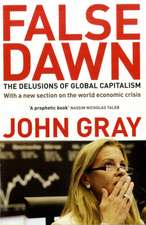The Theory of the Firm: Microeconomics with Endogenous Entrepreneurs, Firms, Markets, and Organizations
Autor Daniel F. Spulberen Limba Engleză Paperback – 5 apr 2009
| Toate formatele și edițiile | Preț | Express |
|---|---|---|
| Paperback (1) | 290.26 lei 6-8 săpt. | |
| Cambridge University Press – 5 apr 2009 | 290.26 lei 6-8 săpt. | |
| Hardback (1) | 956.63 lei 6-8 săpt. | |
| Cambridge University Press – 12 apr 2009 | 956.63 lei 6-8 săpt. |
Preț: 290.26 lei
Nou
Puncte Express: 435
Preț estimativ în valută:
55.54€ • 59.39$ • 46.31£
55.54€ • 59.39$ • 46.31£
Carte tipărită la comandă
Livrare economică 18 aprilie-02 mai
Preluare comenzi: 021 569.72.76
Specificații
ISBN-13: 9780521736602
ISBN-10: 0521736609
Pagini: 544
Ilustrații: 44 b/w illus. 5 tables
Dimensiuni: 177 x 254 x 26 mm
Greutate: 0.93 kg
Editura: Cambridge University Press
Colecția Cambridge University Press
Locul publicării:New York, United States
ISBN-10: 0521736609
Pagini: 544
Ilustrații: 44 b/w illus. 5 tables
Dimensiuni: 177 x 254 x 26 mm
Greutate: 0.93 kg
Editura: Cambridge University Press
Colecția Cambridge University Press
Locul publicării:New York, United States
Cuprins
Introduction; Part I. The Theory of the Firm: 1. The consumer; 2. The firm; 3. Separation of consumer objectives and firm objectives; Part II. The Entrepreneur in Equilibrium: 4. The entrepreneur; 5. Competition between entrepreneurs; Part III. Human Capital and Financial Capital: 6. Human capital and the organization of the firm; 7. Financial capital and the organization of the firm; Part IV. Intermediation by the Firm: 8. The firm as intermediary in the pure exchange economy; 9. The firm versus free riding; Part V. Market Making by the Firm: 10. The firm creates markets; 11. The firm in the market for contracts; 12. Conclusion.
Recenzii
'Daniel Spulber has produced nothing less than a magisterial work. His treatment of firm formation and the role of entrepreneurs in economic activity makes it a certainty that introductory texts in economics will have to be rewritten to accommodate the importance of his work and insight. For the first time, Schumpeter's work has been expanded and settled within the context of modern economics such that the transformation of our economy toward entrepreneurial capitalism has a new and profoundly well-reasoned theoretical basis.' Carl J. Schramm, President, Ewing Marion Kauffman Foundation
'To say that Daniel Spulber's The Theory of the Firm is encyclopedic of everything we know about the business firm would be to sell it short. It is vastly more than a compilation and explanation of the best of extant theory, though it is that; it is also a synthesis of all this information with a new structural approach to theory that will undoubtedly guide research for years to come. Out of this comprehensive treatise on the nature, functioning, and history of the business firm comes an entirely new way of looking at this enormously complex subject. This is a work of scale, scope, wisdom, integration, and analysis such as we rarely see in business scholarship. The business firm has found its Boswell, its Britannica, its Lamarck, and maybe its Einstein.' Henry G. Manne, Dean Emeritus, George Mason University School of Law
'In The Theory of the Firm, Dan Spulber achieves an astonishingly broad and deep contribution to economics that goes beyond the topic in the title. This path-breaking work is a required read for anyone truly interested in economics and finance.' Michael C. Jensen, Professor of Business Administration Emeritus, Harvard Business School
'Daniel Spulber has written an innovative and important book that takes seriously the creation of firms and other institutions by emphasizing the multiple roles of individuals as consumers, workers, and particularly entrepreneurs. Entrepreneurs create firms when they can reduce transactions costs that impede direct exchange between consumers and factor suppliers. In doing so, firms create and manage markets and organizations. The book introduces a series of separation theorems that help to explain the economic role of the firm. The book provides novel mathematical models that address the firm's economic contributions. I highly recommend the book to economists and others with an interest in economic institutions and the organization of economic activity.' David P. Baron, Professor of Political Economy and Strategy, Emeritus, Stanford University
'This important book revolutionizes our knowledge and understanding of entrepreneurship. Dan Spulber breaks important new ground in laying out a coherent and compelling theory of entrepreneurship that is sure to impact all scholars and policy makers focusing on entrepreneurship and innovation.' David B. Audretsch, Director, Max Planck Institute of Economics and Distinguished Professor, Indiana University
'To say that Daniel Spulber's The Theory of the Firm is encyclopedic of everything we know about the business firm would be to sell it short. It is vastly more than a compilation and explanation of the best of extant theory, though it is that; it is also a synthesis of all this information with a new structural approach to theory that will undoubtedly guide research for years to come. Out of this comprehensive treatise on the nature, functioning, and history of the business firm comes an entirely new way of looking at this enormously complex subject. This is a work of scale, scope, wisdom, integration, and analysis such as we rarely see in business scholarship. The business firm has found its Boswell, its Britannica, its Lamarck, and maybe its Einstein.' Henry G. Manne, Dean Emeritus, George Mason University School of Law
'In The Theory of the Firm, Dan Spulber achieves an astonishingly broad and deep contribution to economics that goes beyond the topic in the title. This path-breaking work is a required read for anyone truly interested in economics and finance.' Michael C. Jensen, Professor of Business Administration Emeritus, Harvard Business School
'Daniel Spulber has written an innovative and important book that takes seriously the creation of firms and other institutions by emphasizing the multiple roles of individuals as consumers, workers, and particularly entrepreneurs. Entrepreneurs create firms when they can reduce transactions costs that impede direct exchange between consumers and factor suppliers. In doing so, firms create and manage markets and organizations. The book introduces a series of separation theorems that help to explain the economic role of the firm. The book provides novel mathematical models that address the firm's economic contributions. I highly recommend the book to economists and others with an interest in economic institutions and the organization of economic activity.' David P. Baron, Professor of Political Economy and Strategy, Emeritus, Stanford University
'This important book revolutionizes our knowledge and understanding of entrepreneurship. Dan Spulber breaks important new ground in laying out a coherent and compelling theory of entrepreneurship that is sure to impact all scholars and policy makers focusing on entrepreneurship and innovation.' David B. Audretsch, Director, Max Planck Institute of Economics and Distinguished Professor, Indiana University
Notă biografică
Descriere
The Theory of the Firm presents an innovative general analysis of the economics of the firm.













